Blog / All Posts
The cash conundrum: Interest rates and long-term investments

As the Federal Reserve hikes interest rates ten times to a notable 5.25% in just over a year, holding cash is generating a lot of buzz. Many view cash as the safe haven, especially when money market funds and similar instruments offer returns over 5% annually with minimal volatility. While these returns are enticing, it’s essential to take a deeper look surrounding cash in today’s financial landscape. Where the buzz…
Why investment process quality is key to investing success + our 5-step approach

Why investment process quality is key to investing success + our 5-step approach It’s natural to feel anxious about investing. Investors all want to make the best decisions when it comes to their money and wealth management—decisions that will help your portfolio grow bigger without excessive risk. However, the investment decision process can be overwhelming, given the many available options and pitfalls. Investing is a key part of a financial…
Market turbulence: Please remain seated

Experienced investors know that periods of significant market volatility, just like airplane turbulence, although unwelcome and uncommon, are normal. And until recently, overdue, as we’ve communicated a number of times in Quarterly Context webinars posted here in this blog. Market fluctuations are primarily driven by uncertainty and are unpredictably cyclical. While the reasons change, the most important question to ask is not why volatility is happening, but whether it…
Increase your savings with higher 2025 retirement plan contribution limits

Saving enough each year for retirement is the most important thing you can do towards becoming retirement ready, followed by investing consistently with your life stage and other goals. Not everyone needs to save up to the IRS maximum retirement plan savings limits, but some should save up to the limits (or more, outside of a retirement plan) in order to meet their retirement readiness goals. Most people need to…
How to protect your parents from elder financial abuse and fraud

Everyone thinks elder financial abuse could never happen to their family—until it does. Just look at Alfred Mancinelli. The 79-year-old gave almost $1 million in retirement savings to various con-artists, including one posing as a professional wrestler named Alexis Bliss. Convinced he was in a romantic relationship with Ms. Bliss, Mancinelli refused to listen to his children’s concerns. Instead, the retired man sued his own son for trying to intervene. …
How intergenerational living reduces loneliness and enhances well-being in retirement

Intergenerational living is on the rise, and some say it could be the key to aging gracefully. According to census data, the number of people living with multiple generations quadrupled between 1971 and 2021, to 59.7 million. For many of them, the intergenerational arrangement saves money and improves their quality of life. Some experts also hope it will cure the loneliness that tends to plague older folks. Why are intergenerational…
How pre-retirees can plan ahead for the long-term care reality

The U.S. population is aging. By 2034, all baby boomers will be older than 70 and older adults will outnumber children for the first time in U.S. history, according to Census data. With age comes a greater risk for chronic diseases and conditions—yet most adults are not facing this reality head-on. People tend to worry about how a market downturn would affect their retirement savings. But considering that 70% of…
What the evolution of wealth management means for Generation X and retirement

A recent financial literacy study from Investopedia shows Generation X (or Gen X) is invested in—and concerned about—retirement. Currently between 44 and 59 years old in 2024, Gen Xers recognize that it’s time to get serious about retirement savings. The study showed the top 3 worries for Gen Xers are retirement (21%), followed by saving money (13%) and digital currency (13%). The recent climate of inflation, rising cost of living…
To lower your tax bill, avoid these 9 common tax-planning mistakes

If you think your tax bill is too high, you’re not alone. Two-thirds of Americans feel like they spend too much on federal taxes—and that’s before tacking on property or state taxes. What if you could avoid some of the pains of tax season? From tax-deferred investing to charitable deductions and income deferrals, Americans have a wealth of options to lower their tax burdens. Whether you’re not getting the most…
Higher 2024 retirement plan contribution limits allow for more long-term savings

Saving enough each year for retirement is the most important thing you can do towards becoming retirement ready, alongside investing consistent with your life stage. Not everyone needs to save the full amount allowed to be saved into retirement accounts, but some should, and most people need to increase their savings, to get on track. Pay yourself first by saving an appropriate amount into your retirement account, and avoid being…
Mastering longevity: Financial planning strategies for your health and your wealth

The so-called “sandwich generation” is squished between their aging parents and adult children, like a piece of lettuce. That’s how some are now referring to Gen Xers (born roughly between 1965 and 1980). Between work demands, running a home, and responsibilities to both your parents and your children, midlife is often a time of “peak busyness”. The upside of this stressful time is, it often serves as motivation. The weight…
Are you saving enough? Up to the new retirement plan limits?

Did you increase your savings rate a few months ago when the IRS increased retirement plan savings limits? If not, now is still a great time to do so. In most years, the IRS increases the limit for what individuals can contribute to their retirement plans. If that change slips past you, and/or you forget to increase your savings rate, you lose an opportunity to save more on a tax-advantaged basis….
10 questions that could change your life and financial independence

If you aren’t asking the right questions, you won’t get the best answers. When you change the questions you ask yourself, you can change your life. And the financial dimension of your life is no exception. Use the following 10 questions to help clarify your direction, establish meaningful milestones, and solidify a commitment to getting where you want to go. 1) How would having clear life goals impact your life? When your goals are…
Recessions and your financial plan

The threat of a recession continues to be one of the most pressing concerns for investors. Inflation has proved hard to restrain, and the Federal Reserve continues to raise interest rates. Disagreement on recession likelihood Whether the U.S. will fall into a recession is still uncertain, and a subject of debate amongst experts. According to a recent UCLA Anderson Forecast, the U.S. is not currently in a recession, and the chance…
Insurance during your midlife gap year: make sure your career break is fully protected

You’re embracing the idea of a midlife gap year. You’re picturing the landscapes, culture, and bucket list experiences in your mind. But unattended business is holding you back from peak excitement. You need proper insurance in case something goes wrong. When you’re taking a career break it’s tempting to ignore that responsible voice in your head. But if you do, this thrilling chapter of your life will be written with unnecessary…
Money and happiness: a multi-dimensional look at how finances and positive emotion interact

We’re all aware of the phrase “money can’t buy happiness.” But how much weight does it really hold? After all, our finances play a pivotal role in how we’re able to provide for ourselves, our families, and our communities. Money clearly doesn’t solve every problem. Many of our relationships are priceless. And no matter how much money you have, you can never buy more time. So it’s critical that we…
What to do in a volatile market: Should I sell my stock?

The stock market has been anything but stable recently. And unsurprisingly, that usually means our emotions haven’t been either. Financial freedom is tied to market performance, and when you start hearing about “down markets” or “recessions,” one question tends to come up in our nervous brains… Should I sell my stock? At its face it seems like a reasonable question. Afterall, if the market is headed for a prolonged downturn,…
The Gen X dilemma (part 1): how do you financially prepare and launch your children?

Gen Xers are caught in quite the pickle. You’re sandwiched between your aging parents and restless teenagers, and feel the financial pressure from both sides. You want to help, but feel uncertain of where to start. So what do you do? In this article, we’re going to focus on how to prepare and launch your children. More specifically, we’ll zero in on how you can help them find their financial…
Charitable giving: use financial planning to max your impact

Helping Ukraine is the primary focus of many right now, and you may be rushing to direct your charitable giving to the country and its people. You may also want to aid businesses, schools, and organizations trying to recover from COVID-19. Maybe supporting weather-devastated areas razed from fires, earthquakes, and hurricanes is a top priority for you. Add in cause-driven and political contributions along with tithing to religious institutions, and…
Inflation, investing and innovation – how to stay calm amid uncertainty

Is inflation on your mind? It would be surprising if it weren’t. While we all have to weather inflation’s short-term effects, we have reason for optimism over the long term. Here’s a look at where we are right now. Inflation, labor shortages, and supply chains The effects of nearly two years of the pandemic compounded by the Omicron variant’s impact hamper economic recovery as we face labor shortages, supply chain…
2022 retirement contribution limits increase for Gen X business owners

Retirement contribution limits increase for 2022 Employees will be able to save more in 2022 with the IRS increases to retirement plan contribution limits. You can defer an additional $1,000 through payroll deduction in 2022. This means you can contribute up to $20,500. One way to accelerate your path to financial independence is to make sure you are taking advantage of the tax-deferred contributions and compounding growth available through your retirement plan(s). Which of these…
11 financial planning and tax-saving moves to make before year end

As we rapidly head into the last few weeks of 2021, now is the time to take care of any time-sensitive financial planning moves and get prepared for 2022. You may be able to reduce your tax bill, too, with some of these action steps. 1. Maximize your retirement savings You have until December 31 to make any last-minute contributions up to your limit up to $19,500. If you are…
Staying ahead of the game: how to keep the strong stock market from jeopardizing your life goals

Are you ahead of the game when it comes to achieving your financial independence? Has the unusually strong stock market boosted your wealth to the point where you think you could work less or stop working sooner than expected? Are you at a point where you are increasing your current or future lifestyle expectations? Maybe your experience is all of the above. If so, that’s an exciting feeling. The possibility…
Why a market correction shouldn’t make you worry

When stock market performance outpaces expectations for an extended period, as it has recently, the anticipation of a market correction (a drop of 10% of more) can worry investors. But, should you be concerned? After all, significant drops in the stock markets are fairly common, as are rebounds and new highs. While market fundamentals play a large role in these fluctuations, so does investor sentiment. This makes it impossible to…
Ironman Insights: 3 principles to follow to achieve your next big goal

What is one of your big life goals? What’s a wild dream you’d like to achieve? When you’re in the midst of peak busyness, you may feel you can’t go after what you desire. Not true! As we head into the last few months of 2021, now is the perfect time to reflect on what you want to accomplish, not only through the end of the year, but in 2022 and…
How to think about inflation and investments

There has been a lot of talk lately about inflation, in great part because inflation has been so low for so long, but recently had a small spike. Unfortunately, when inflation is low, investors tend to forget it is a “sleeper risk,” gradually eroding their purchasing power and lowering after-inflation returns. Below are thoughts to consider. Why does monetary policy matter when it comes to inflation? Historically, periods of major…
Save more in 2021: 6 opportunities for midlife professionals and business owners

As you reach certain midlife milestones, you gain opportunities to save more money, whether through tax-deferred vehicles or identifying key expenses where you may be overpaying. Business owners also have a chance to bounce back from what may have been a slower year in 2020 with some favorable tax rules. Which of these options can you take advantage of this year? Delay tax payments Business owners who had a down…
Wealth and happiness – the surprising factor that can increase well-being

Does money buy happiness? Wealth and happiness are often paired together. As you earn more income, invest more into the market, or reduce your debt, you likely feel more life satisfaction. This seems obvious, and many studies* prove this to be correct. However, in a study conducted by researchers from UC, Riverside, a surprising factor emerged about how you can improve your overall feeling of well-being: the amount of cash you have…
Gen X insurance: how to put proper midlife protections in place

If you’re a Gen X-er, it’s likely your life is starting to look very different than it did in your early years when you were just beginning your career and starting a family. Now you’ve made significant headway in your career, earn a higher income, and have amassed significantly more wealth. Your children may be approaching the age where they can begin driving or they’re getting ready for college. You may also have…
What California homeowners need to know about Proposition 19

On election day, the narrow passage of Proposition 19 in California brought good news for some homeowners. The new law allows homeowners who are over 55, or disabled, or victims of wildfires or other disasters to transfer the tax base of their primary residence to a replacement residence. This expands on the current law which allows homeowners over 55 to retain their tax base within their own county or some reciprocal counties,…
Inflation’s effect on 2021 retirement contribution limits

The IRS released the dollar limits for 2021 qualified retirement plan contributions. For 2021, employees’ and owners’ ability to defer compensation and invest for their future remains about the same as 2020. Because of low inflation, most of the common contribution levels were left unchanged, with defined contribution total dollar amounts (from employee and employer contributions combined) increasing by only $1,000. Although individual contribution levels have not increased, super savers ,who focus…
Q3 2020 Quarterly Context Webinar
Interesting contradictions between the economy and markets, Wall St. and Main St. remain… Wobbly economy but stocks, and gold and COVID-19 cases keep going up, while stimulation is high from rates remaining addictively rock-bottom low. How long is the recession expected to last? What impact will elections have on markets, and what has the historical impact been? The GDP annualization whip-saw. FAAANM (big tech) stocks’ increasing influence on markets and…
Create your own Blue Dot to experience Blue Zone benefits

What if you had the recipe of life choices that could help you live longer, healthier, and happier? That is exactly what studies show happens in “Blue Zones,” parts of the world with unusually high numbers of happy centenarians. If you don’t live in a Blue Zone, you do not have to move. You can strive to create your own Blue Dot right where you are. Read on for some of…
An opportunity within a crisis within a crisis within a crisis

In this time of national stress, the global coronavirus pandemic and the economy have taken a back seat to the centuries-old and often ignored and re-opened wounds of the Black community. Individuals, companies and other institutions have a new opportunity to listen and create a better path. We stand in support of equality and dignity WealthStep condemns racism and discrimination and stands in support of equality and dignity for all…
The rationale for investment manager changes

Sometimes, WealthStep needs to change the investments (i.e. mutual funds) held within 401k plan portfolios, or WealthStep Direct (for individual investors outside of retirement plans) portfolios. Rebalancing and tax loss harvesting for taxable portfolios are ways to keep portfolios’ allocation in check and lower tax bills, but what happens when a specific investment manager of a mutual fund or other vehicles needs a change? How does WealthStep decide when to…
Drawing from experience to navigate uncertainty

These past several weeks are a good reminder of the value of humility in facing something not seen before. There potential economic implications of COVID-19 are significant, and there are learnings from past crises, even if they were different. Back to basics It is very difficult, but especially important, to rely on fundamentals at times like this. The disruption that COVID-19 brought forces all people to get back to basics…
Volatility, Optimism, and Q1 Market Details

There’s no question we’re all living in unsettled times. Global citizens and the world economy are under stress, and uncertainty is heightened in all aspects of our lives. People are worried about their health, and that of family, friends, neighbors. Some have temporarily or permanently lost jobs or taken a hit to their income. Leaders of many companies are forced to make difficult decisions. Social distancing is impacting the human…
Why rebalancing your portfolio in the midst of crisis is essential for long term success

In the midst of the COVID-19 pandemic, the term rebalancing now extends past investment portfolios as we all rebalance our lives around staying at home, creatively social distancing, and protecting our health. It is a rebalancing act that people did not anticipate; we’re all learning lessons that will linger on once this crisis is behind us. The rebalancing that WealthStep does for 401k plans and “WealthStep Direct” individual clients, however, is…
The CARES Act: help for individuals and small businesses

As we adjust to the effects of COVID-19 in our lives, stimulus package passed by Congress on March 27th may help individuals and small businesses. The Coronavirus Aid, Relief and Economic Security (CARES) Act, as well as previously announced tax filing relief, should help with business and personal cash flows and provide economic stimulus. In addition, prior action by the Federal Reserve to reduce interest rates and provide liquidity…
In or starting a small business? Explore the Paycheck Protection Program starting 4/3/20, and other programs

To help businesses survive the coronavirus economy, the government is providing support. If are in or run a small business adversely affected by the coronavirus directly or indirectly, explore the recent CARES Act Paycheck Protection Program (PPP) forgivable loan, Disaster Loan (& grant) Assistance, or Employee Retention Credit program. The PPP started 4/3/20 for small businesses, and 4/10/20 for sole proprietorships and independent contractors. These programs expects high application volume,…
Financial help from your 401(k) – How the CARES Act helps retirement plan participants

The Coronavirus Aid, Relief, and Economic Security (CARES) Act was signed into law on March 27, 2020, and includes provisions to assist retirement plan participants impacted by the COVID-19 pandemic, through financial help. The new law provides distribution and loan relief to participants if you have been diagnosed with coronavirus disease or if you have experienced adverse financial consequences due to the pandemic on account of being quarantined, furloughed, or…
Video: How to understand and handle market volatility related to the coronavirus

Gain perspective about the confluence of events affecting the markets, including the coronavirus. What are the drivers of current volatility? Where do markets and diversified portfolios stand now? How does this market compare to the many volatile markets in the past? See how bad markets have strong recoveries. See why panic is not an investment strategy. See how an even bigger drop would still leave investors with solid medium-term average…
6 work from home tips we’ve learned so far

With the shelter in place in effect in Northern California since last Tuesday, and more places to come soon, many of having had to shift from going to the office to working from home. WealthStep is well set up to operate as a virtual office, and should not experience any interruptions. Here are a few remote tips we hope will help you. Make your life easier Upgrade your Internet service: Now…
Markets react to coronavirus: how to weather the challenges ahead
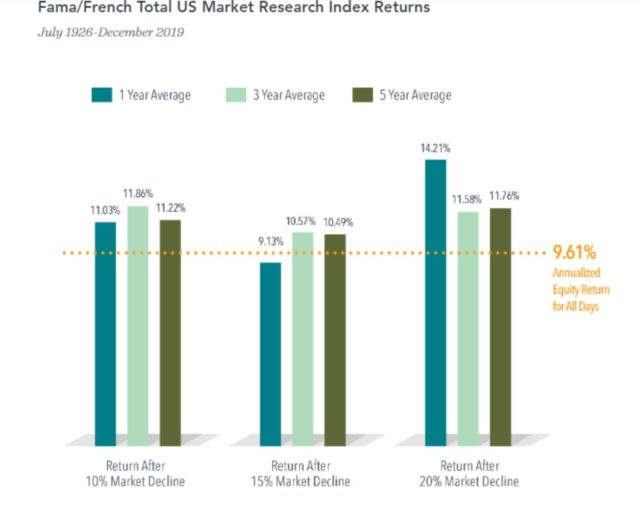
It’s been a difficult week and a half for investors, as the uncertain trajectory of COVID-19 upset people’s sense of well-being, public health systems and the financial markets. Coronavirus and its economic fallout, coupled with the Saudi/Russia oil tension, have created a unique mix of anxiety that makes markets particularly volatile. No one can predict what will happen over the short term, but we have confidence, based on past experience,…
How we’re thinking about coronavirus

The public’s concern about coronavirus (COVID-19) is increasing. As is often the case, concerns are frequently magnified by what’s called “negativity bias,” an evolutionary mechanism in the brain to minimize risk. More often than not, people over-react to potential risks. But sometimes the reaction is warranted. Regarding coronavirus, it is too soon to tell how justified these worries are, and the appropriate level of concern at any point in time…
Longevity’s ripple effect: Why Gen X cannot count on inheritances for their retirement

As if Gen X (now age 40 – 55) didn’t have enough to think about in midlife, they also need to be careful about including any expected inheritance in their retirement planning. While there is much talk about a great transfer of wealth in America in the coming 25 years, with estimates anywhere from $30 – $65 Trillion, this estimate and its timing is by no means a sure thing….
Q4-2019 Quarterly Context Webinar

What should you be training your brain to do now, given the longest bull-market ever? What are people doing with their better physical state later in life? Where are we in the business cycle now? What is the “Fed pivot” and how are market returns projections changing for the next 10 years? What does “growth recession” mean and is that the new normal? Where does the 2019 market return…
The SECURE Act: What individuals and business owners need to know

Business owners, especially smaller employers, now have more incentives and options to offer retirement savings plan. Individuals have additional opportunities to grow their retirement savings. Signed in to law by the President on December 20, 2019, The SECURE Act (‘Setting Every Community Up for Retirement Enhancement”) brings the most significant pension reform in more than a decade. The goal of the legislation is to promote retirement savings and affects both individual investors…
3 book recommendations

What are you going to read (or listen to) next? Whether you want to form new habits, create systems in a business, or preserve what’s meaningful to you, you can find answers in these books. Atomic Habits by James Clear James Clear, one of the world’s leading experts on habit formation, shares practical strategies in his book Atomic Habits that can be of particular interest to business owners, leaders, and entrepreneurs as you…
Is your company prepared for the next disaster?

Preparing your workplace for a natural disaster is as critical as preparing your home, yet many businesses do not have an emergency plan in place. In the Bay Area, earthquakes are a constant threat with no advanced warning, and the “new normal” of California fire season reminds us how devastating nature can be. Other regions have risks that are different but also dangerous. Whether or not the business and your…
2020 IRS contribution limit updates means you can save more in your retirement plan

You can now save more in your retirement plan! See below for 2020 IRS contribution limit updates, and click the link for IRA account and other updates. 401(k), 403(b), 457 Plan deferral Limit: 2019: $19,000, 2020: $19,500,“Catch-up” Contribution >age 50: 2019: $6,000, 2020: $6,500Defined Contribution Total Dollar Limit: 2019: $56,000, 2020: $57,000Highly Compensated Employee definition: 2019: $125,000, 2020: $130,000Click here for full IRS announcement of 2020 limits Some lower-income folks…
Q3-2019 Quarterly Context Webinar

How many generations does it typically take to wipe out family wealth, and what can you do about it? What is the impact of emotional investing on the average investor’s returns? How would the economies of all US 50 states rank if they were countries? How should Fiduciaries evaluate target date funds? Is a CEO economic confidence index up or down? How many months after an inverted yield curve does…
Start this conversation with your aging parents now

The time to discuss issues related to your parent’s aging is before you need to. Some senior care professionals promote the idea of the “40-70 rule”, advising that you begin conversations with your parents about their plans and desires once you reach age 40 or they are age 70. While this may seem early since most 70-year-olds are still quite independent and may still be working, you want to…
How to enjoy vacation without working

With smartphone connectivity, taking a “real” vacation may seem impossible for some people. While you appreciate the notion that time away is rejuvenating, you may not always embrace it. Even when you do take time off, the temptation to check your phone or review your email magnifies as soon as you step away from the office. Make relaxation and enjoyment a priority. “What if I’m needed while I am gone?”…
A few ideas to help plan for college savings & financial aid

If you have children that plan to attend college, you have opportunities to make it easier to pay for college. And, if you happen to be a small business owner, one of the most favorable treatments for business owners is your ability to increase the amount of financial aid for which your child may qualify by lowering your “expected family contribution” (EFC). The EFC is the baseline for calculating federal…
Make yourself and future generations of retirement savers into “super savers”

April was Financial Literacy Month, which led to a flurry of articles about the retirement crisis in the U.S. One piece noted that the “average” retirement savings amount, paltry though it is, is often an overstated figure because it is the average (i.e. mean) rather than the mid-point (i.e. median) and therefore overstates the “average” savings level. It indicated that although the “average American” has about $200,000 in retirement savings, the median…
Do you suffer from investment FOMO? The periodic table of investment returns can help.

Most people are not investment experts, and don’t have the time, inclination or energy to research and design the right mix of investments for their personal portfolio. Yet, with daily hype from the media or the unsolicited advice of friends who invested in a winning stock, you may still experience FOMO with your investing. This ‘fear of missing out’ on the most recent hot returns may cause you to make…
When boring is good

When the stock markets have long periods of positive returns, as they have had for most of the past decade, it can be easy to forget how a bear market feels to an investor. The last quarter of 2018 provided a vivid reminder. Large market swings and precipitous drops can unnerve even the most experienced investors, despite knowing that these swings are to be expected and are part of the…
Q4-2018 Market Review

Investors’ appetite for risk, while elevated for much of 2018, evaporated as the year drew to a close and wiped out positive returns for the year across broad asset classes (T-bills being a notable exception). Concerns over tighter monetary policy and the global withdrawal of stimulus measures, unresolved trade disputes, falling oil prices, slower global growth, and softer data in some U.S. indicators overshadowed other robust aspects of the domestic…
Lessons from a flat tire – how to handle stock market volatility
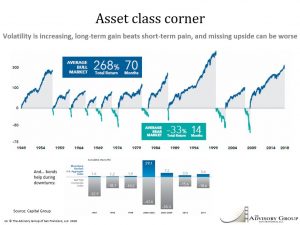
Is recent market volatility making you nervous? Perspective could help you stay calm and on track. Your financial journey is a lot like a car trip. On your route from point A to point B, while driving wisely, it is normal to experience stoplights, curvy roads, bad weather, or other elements that slow you down. A few times in your life, you might hit a pothole or nail that causes…
2019 IRS contribution limit updates means you can save more in your retirement plan

You can now save more in your retirement plan! See below for 2019 IRS contribution limit updates, and click the link for IRA account and other updates. 401(k), 403(b), 457 Plan deferral Limit: 2018: $18,500, 2019: $19,000 “Catch-up” Contribution >age 50: 2018: $6,000, 2019: $6,000 Defined Contribution Total Dollar Limit: 2018: $55,000, 2019: $56,000 Highly Compensated Employee definition: 2018: $120,000, 2019: $125,000 Click here for full IRS announcement of 2019…
Now is a good time to learn the lessons from the Global Financial Crisis
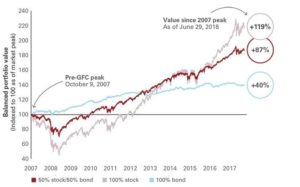
As we hit the 10-year anniversary, there are lessons to learn from the economic challenges and 2nd worst market in history, and subsequent recovery, that began a decade ago. 10 years is long enough that some people don’t even remember this major financial event, while others feel like they are still recovering, given that the economy’s recovery has been gradual, even though the market’s recovery has been strong… maybe a…
Interest rates are shifting and will impact you… maybe more than any other economic indicator.

The Federal Reserve Bank’s Open Market Committee adjusts rates, down to stimulate the economy when needed, and up control inflation and prevent the economy from overheating during times of growth. In the first several years after the Great Recession, people thought little about rates. The Fed’s target rate fell to 0% late in 2008 and stayed at 0% for 7 years. Such extended periods of low rates is highly uncommon,…
Q2-2018 Market Review

Summer months are typically a quiet time for the markets. Recent events, however, may disrupt this tradition. Threats of escalating trade wars have cast a pall over equities, and numerous geopolitical uncertainties continue to push investors toward a more cautious stance. A desynchronization in global growth as well as a divergence in central banks’ monetary policies have contributed to U.S. dollar strength and wreaked havoc on emerging markets. Currencies of emerging…
Current market volatility is an investor test, not a market test

After years of unusually low market volatility that hypnotized a large swath of investors into believing yet again that markets only rise, the market drops of the last 2 days are a healthy reminder that stock market fluctuations should be viewed as a normal part of investing. Don’t forget, as is the case with food, good nutrition isn’t always tasty, but is beneficial in the long run. Eat your Brussels sprouts! As disciplined institutional investor Warren Buffet wisely said a while back, “The stock market is a device to transfer wealth from the impatient to the patient.” So, the real question is… do you want to be in the panic (impatient) group? Or the profit (patient) group?
Article library & oldies but goodies

News articles to help you make better financial decisions. Topics include investor behavior, smart financial choices, investor pitfalls to avoid, and other topics.
Maybe spend more $ in early years of retirement

Good news… you may be able to spend more in the early years of retirement than you thought. Smart in-retirement spending approaches were always critical to not running out of money have always been important, but new studies on longevity and spending patterns of those in retirement shed new light on the subject. You spend most of your life saving for retirement, so making sure the money is spent wisely…
Q4-2017/Year End Market Review

2017: A Year of Records Macroeconomic Environment Another record low in volatility, more record highs in global stock markets, mixed records in global temperatures, a record number of natural disasters in the U.S., and many records associated with President Trump. The VIX Index, a widely used measure of expected stock market volatility, fell more than 20% in 2017, reaching an all-time low in November. Stock markets hit a number of…
Take action now to reduce the risk of identify theft
If you are reading this (or even if you are not!), it is likely that you were one of the 145 million Americans whose information was exposed in the Equifax data breach earlier this fall (announced by Equifax in September of 2017), given that 145 million represents a high percentage of all adults in the U.S.. Now that the dust has settled, if you have not already done so, consider…
But why bother with a Bun?
Some time back, a fast food chain ran an advertising campaign featuring a study group of meat and cheese lovers. In the ad, the facilitator explains company’s new burger, and one of the test attendees indicates that he’d rather only have the tastiest part of the meal when he answers “I like the meat and cheese part, but why a bun?” Investors also sometimes ask themselves “Why the bun?”, however the question…
What is the right path to get there?
After 8 years of positive market returns and increased uncertainty in politics, should you be more worried about market fluctuation risk? Is it “different this time” and should you be more conservative as an investor? It is common to feel nervous and have questions questions at this point in a market cycle and when the Oval Office has changed hands. It may make sense to make a change if you…
Want to improve your returns? Keep your finger off the button.
It’s a new year and president, and with that comes uncertainty and many opinions about the direction of the investment markets. What’s key to remember is that uncertainty is nothing new. Studies suggest that despite major political and economic events that can impact returns in unpredictable ways in the short-run, it’s better to keep stay away from the panic button if you want better long-term results. A recently updated Dalbar,…
What do the new annual savings limits mean for you?
Below are the IRS updates for 2017, which are similar to 2016 due to low inflation. Read on for special opportunities to save more… 401(k), 403(b), 457 Plan deferral Limit: 2016: $18,000, 2017: $18,000 “Catch-up” Contribution >age 50: 2016: $6,000, 2017: $6,000 Defined Contribution Plan Total Dollar Limit: 2016: $53,000, 2017: $54,000 Highly Compensated Employee definition: 2016: $120,000, 2017: $120,000 Click here for full IRS announcement of 2017 limits Some…
An age-based savings multiplier rule of thumb as a quick test
One retirement readiness rule of thumb: Have 1x your salary saved by age 30. What about other ages? …2x at age 35, 3x at 40, 4x at 45, 6x at 50, 7x at 55, 8x at 60, and 10x at 67. These are general rules of thumb, however, that vary according to when you plan to retire and other factors. Use the WealthStep free Planning/Saving advice engine to get advice…
Uncertainty is an interesting beast
Life would be less interesting if we knew how everything would turn out in advance. However, the same factor of the unknown that makes investment markets nervous is what makes investing attractive in the long-run. Unpredictability can cause asset prices to drop, but is also indirectly what pushes prices higher when good news occurs and fear diminishes. Over the last year, surprises included continued slow global growth, the first interest…
Noise gets more attention than silence, however what is quiet can sometimes be dangerous to ignore
Stock market volatility attracts a lot of attention in the news, which causes some people to believe that such fluctuations are the only retirement preparation risk. In reality, there are other risks that are worse. Here’s the lowdown… When scared investors reduce volatility risk (i.e. reduce or get out of stocks), other risks increase… inflation and longevity risk. Inflation risk is about rising prices, if your savings value isn’t also…
What to make of “Brexit”
SUMMARY: The United Kingdom’s vote last week to leave the European Union has global significance, but it may take years to know the full impact. The U.K. is likely to feel long-term affects. In the short term, uncertainty about the degree of global ripple-effect makes investment markets nervous. Given tepid global economic growth, the medium-term stock market outlook that was already guarded before Brexit is a bit more so now,…
Wait a minute… the new “Fiduciary Rule” is supposed to make all financial advisors put their clients’ best interests first, but has exceptions?
A few weeks ago, the Department of Labor finalized the new “Fiduciary Rule.” In concept it helps protect investors from abuse, but it has big gaps, through exceptions. Unfortunately the gaps are not easy to find, but could negate much of the intent of the new rule. As context, most people aren’t aware that investment advice companies fall into two groups: 1) A big group of companies, enormous and tiny,…
Learn to like volatility
How many songs have you heard that include lyrics like “Here we go again” or “It happened again” or “I did it again”? There are many, because trials and tribulations in life are many. The best outcomes happen, however, when you push on through.
When markets drop: take deep breaths, and don’t do anything
Given the recent increase in market volatility, the article below may be a helpful read. As a WealthStep client or follower, you may have heard these timeless ideas before in our letters, webinars, and blog / Facebook / Twitter posts (follow us to get helpful thoughts and reminders!).
The Reality of Red Numbers
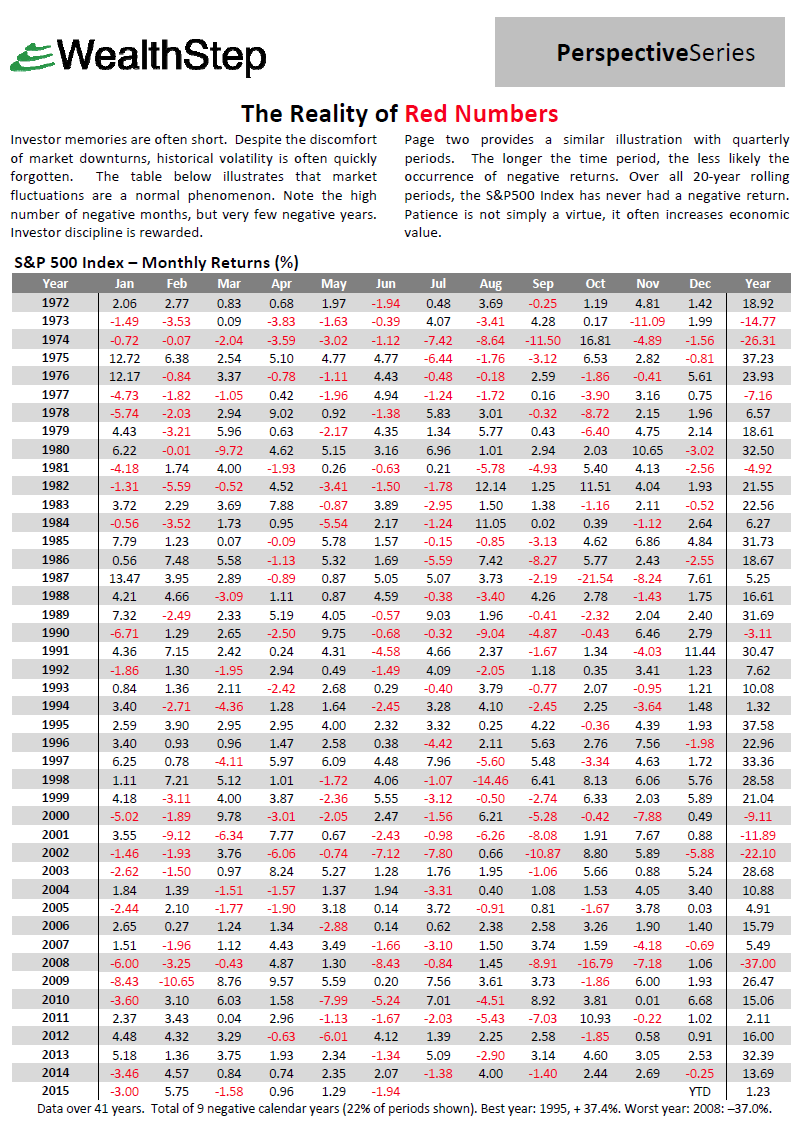
How often are monthly stock market returns negative? Is there a pattern within years or across years? How about the bond market? You may notice that short-term volatility is a fair price to pay… the longer the time period, the fewer the negative returns. In other words participation and patience pays. And, remember that inflation (i.e. purchasing power risk) is a bigger long-term risk than market volatility. Gain perspective from…
Simple or Simplistic? Which gets you to financial independence?
Most people want to help keep their investment planning and lives simple, but they don’t want to risk their futures with overly simple guidance. This is a critical distinction, and those that understand it tend to have better outcomes. In this context “simple” should mean “easy and helpful.” Simplicity happens when you do the hard work of working and saving/investing enough, while objective experts do the hard and right work…
Buyer beware – Proposed investor protections don’t actually protect much
True or false?: All financial firms and professionals are required to act in your best interest, right? Answer: FALSE. Many have conflicts of interest, and biased “advice” damages results… A recent White House Council of Economic Advisers analysis estimate showed that conflicts of interest hurt affected investor accounts by ~1% each year. This amounts to around $17 billion annually. And since it is mostly related to fees and costs, it…
Doctrine of the Mean

When one asset class is outperforming another within a diversified portfolio, investors sometimes wonder why both are held. The recent US stock market vs. the weaker International market such an example. The non-US stock market’s (MSCI EAFE) 3-year annualized return was not far off long-term stock averages, but the US market’s (S&P 500) unusually high 3-year return of 17.9% made well-balanced investors envious of less diversified portfolios. During the financial…
You choose: Fiduciary vs. suitability standards of care
There are two very different standards of care, when it comes to financial professionals: “Fiduciary” (registered investment advisors, regulated by the SEC/Securities & Exchange Commission) and “suitability” (brokers, “self-regulated”). Below is a condensed version of a Washington Post article that summarize it well: Fiduciaries have a much stricter duty and legal obligation than do those who operate under suitability rules. Investors rarely come out on top when a self-regulating entity…
So You Think You’re a Risk-Taker?
Nothing is more important for investors than learning how much they can stand to lose. But nothing is harder to learn—before it’s too late. http://blogs.wsj.com/moneybeat/2014/10/24/so-you-think-youre-a-risk-taker/
Will a Stock Market Correction Derail your Goal?
Corrections are more normal than often thought and should be inconsequential. Bear markets, which are periods of more significant decline, should be surmountable if you have planned properly. Stock market “corrections,” defined as drops of 10% or more, are not more likely at the top of a market. Between the years 1900-2013, the Dow (DJIA) stock index dropped 10% or more about once a year. Stocks do not maintain steady…
The Reality of Red Numbers
What’s your guess as to how many months the stock market declines or rises each year? And in bad vs. good markets? Our yearly update of “The Reality of Red Numbers” shows you, and illustrates that market volatility is often a reasonable price to pay as part of a diversified portfolio, to help capture long-term positive returns… whereas inflation (purchasing power risk) is often a more harmful risk in the…
Goin’ up, goin’ down… let it roll
“Goin’ up, goin’ down, goin’ up-down-down-up… any way you want, let it roll” (song lyrics). Volatility has been low in the past few years. As measured by the VIX volatility index, market fluctuations are at the lowest level since before the global financial crisis. That doesn’t mean high volatility is immediately around the corner, but it is important to remember that smooth markets are not the norm. All investors should…
WealthStep Update
The Advisory Group of San Francisco, the company that operates WealthStep, was recently ranked in FT Top 300 Registered Investment Advisors, in Financial Times 6/2014 study.
Quarterly Thoughts – Q1 2014
Are there clear patterns of investment market returns over time? How does a “balanced” portfolio compare to individual asset classes over time? Our chart entitled “The Periodic Table of Investment Returns – A Case for Diversification Amid Uncertainty” is a colorful illustration that addresses these questions. People are not naturally wired for investing. Without discipline, it is human nature to make mental errors, often due to “recency bias” and the…
Quarterly Thoughts – Q4 2013
Will a disciplined investment process improve your health? Recent research says yes. Stress caused by dramatic market movements, the financial press, and investors’ common behavioral mistakes can make people feel queasy… or worse. A March 2013 study by the University of California at San Diego found that hospitalizations rise on days when stock market prices fall. Another study published in the American Journal of Cardiology showed a significant correlation between…
Quarterly Thoughts – Q3 2013

Consider focusing where you can make an impact, in terms of your life goals and financial goals. The simplicity of this diagram is profound. The world around us is complex and full of “noise,” both statistical and theatrical (e.g. TV news, etc.). The senses are bombarded with eye and ear-catching attempts to grab your attention. The challenge is to remain focused on what counts. Insufficient focus leads to distraction and…
Quarterly Thoughts – Q2 2013
In investing, “normal” is an elusive idea. Long-term average returns are relevant for planning, but rarely does a stock market calendar year return fall within a range of 2 percentage points around the average. If “normal” does exist in the stock and bond markets, it can be loosely defined as a predictably unpredictable sequence of short-term economic events, followed by investor over-reaction and the ensuing volatile returns in the market….
Quarterly Thoughts – Q1 2013
Market Volatility is the norm, not the exception. Yearly, we provide an updated version of the enclosed Periodic Table of Investment Returns. Given the recent global financial crisis and partial recovery market experience, the table is particularly timely, as it provides a broader perspective. This chart is a powerful visual demonstration of the unpredictability of investment returns across major asset classes, and indirectly illustrates the importance of diversification, discipline, rebalancing…
Quarterly Thoughts – Q4 2012
Despite the sluggish economy and the general perception that there has been limited progress after the global financial crisis, most stock markets rose 16% to 20% for the year, some market indices are now recording new highs, and the current U.S. stock market recovery, adjusted for inflation, is on track to be the fastest recovery amongst those that followed the four worst market crashes of all time. While this may…
Year-end 2012
Year-end is often a time of reflection and gratitude. Recent events make that difficult, but not impossible… The Sandy Hook tragedy makes our hearts ache. But, our hearts will not break, having seen the overwhelming response to the victims’ families and the possibility of the positive changes which may result from the experience. WealthStep’s mission is to influence and facilitate positive changes in the lives of our clients and in…
Quarterly Thoughts – Q3 2012
What does “safe” mean? When driving car or playing baseball, the answer is generally clear. When investing, the answer is less obvious. To get where you want to go financially, it is critical to properly frame the problem, by asking the right questions: safe “from what risk?” and “when?” Safe from volatility risk? Or interest rate risk? If so, at the expense of inflation risk (i.e. purchasing power)? Longevity risk…
Quarterly Thoughts – Q2 2012
Are you in the panic group or the profit group? Often times, the discomfort of sea or motion sickness can be avoided or reduced by keeping one’s eyes on the horizon. Similarly, keeping a long-term focus can reduce “emotion sickness” of the investor kind. Anticipating and managing such discomfort is paramount, because an investor’s ability to focus on the goal rather than on short-term disturbances can impact the timing and…
Quarterly Thoughts – Q1 2012
Are you taking the right or wrong risks? Inflation is one of the various and worst risks investors must consider in the long-run. Inflation is currently lower than historical averages due, in part, to the slow economic recovery. However, the prices of goods and services tend, eventually, to rise after a period of eased or stimulative government “monetary policy,” such as we have seen in recent years. Regardless of short-term…
Quarterly Thoughts – Q4 2011
Instincts are sometimes critical for survival. If you experience fear of physical danger, your instinct may be what saves your life or the life of others. Before you’ve had time to think, fear triggers an automatic response that may cause you to run, duck, jump or fight. Unfortunately, an increasing number of behavioral finance studies show that instinct and investing often mix poorly. The human brain often responds to concern…
Quarterly Thoughts – Q3 2011
By the first half of 2011, after a post-crash jump in investment prices, many disciplined investors felt a material level of financial and emotional recovery from the 2007-2009 credit crisis market. The third quarter of 2011, however, was a reminder that the bumpy road to full recovery is not yet over, as the world slipped on Greece (how about that pun!?). Small economies can sometimes be the tail that wags…
Quarterly Thoughts – Q2 2011
Who is on your side? Insightfully, when asked what his profession was in the 1979 film “Manhattan”, Woody Allen’s character responded, “I’m a stock broker. My job is to invest people’s money until it is all gone… I’m frequently wrong, but never uncertain.” Sadly, most investors still aren’t clear about the difference between securities salespeople, i.e. “brokers” or commission-based or fee-based “advisors” (i.e. accepts fees AND commissions, unlike fee-only advisors),…
Quarterly Thoughts – Q1 2011
“The only certainty is that nothing is certain” ~ Pliny the Elder, First century Roman. Despite major unrest in parts of Northern Africa and the Middle East, a massive earthquake, the subsequent tsunami and partial nuclear meltdown in Japan, renewed sovereign debt concerns in Europe, and continuing inflationary pressures in certain emerging market countries, the global economic recovery pushed on. If recent events teach us all anything, it is that…
Year-end 2010
To start the new year, let’s take a look back at 2010 from an investment perspective. For the second year in a row, stock markets rose more than the historical averages. Bonds were also positive for the year. Discipline was again important… 8 months into the year the S&P 500 Index was down 5.8%, but later surged to a 15.1% gain for the year, recouping all of its losses since…
Quarterly Thoughts – Q3 2010
Maintaining reasonable expectations, embracing the sometimes uncomfortable reality of incertitude, and living within one’s means, are fundamental to defining and achieving realistic goals. Referring to unpredictability, Benjamin Franklin once said that “nothing can be said to be certain except for death and taxes.” Behavior finance research increasingly suggests that another near-certainty is that the human brain is wired to make investment mistakes if not properly trained. WealthStep helps educate clients…
Quarterly Thoughts – Q2 2010
After feeling some recovery related relief after the market bottom in March, 2009, the bumpy last few months are making some investors nervous. Such recovery related dips, however, are not inconsistent with previous strong markets. There have been 11 bull markets since 1945, and during those markets there was a correction of 10% on average, in the 11th month of those recovery markets (this recent correction occurred in the 14th…
Quarterly Thoughts – Q1 2010
Out of the ashes rises the Phoenix – almost. The “ashes” of the financial crisis we have experienced could have given rise to a new “financial Phoenix”: a total standard of fiduciary care and responsibility by the financial industry. It almost happened when legislation was proposed which would have created such a standard. But in the end, it was defeated by powerful, conflicted financial institutions: brokerage firms and the insurance…
Quarterly Thoughts – Q4 2009
“The years teach much which the days never know” – Ralph Waldo Emerson. In the past 18 months we have witnessed the worst crisis for the global financial system since the Great Depression, the steepest stock market decline since World War II, the biggest cut in dividend payments since the 1930s, and the fastest stock market surge in 70 years. Many of the “talking heads” incorrectly predicted the beginning of…
Year-end 2009
On December 31st, we will have completed the first decade of this century and millennium. Think about what we have all experienced in the last 10 years: Y2K without systems collapses; the end of one of the greatest bull markets, two of the four worst markets in history; terrorist attacks on our soil; war in Iraq and Afghanistan; oil prices going through the roof; the acceleration of global warming; the…
Quarterly Thoughts – Q3 2009
During this Global Financial Crisis or “Great Recession,” the foundations of Wall Street and the global financial system were shaken by the collapse of Lehman Brothers, the vanishing of Merrill Lynch as an independent entity, and the take-over of AIG by the government, amongst other events. Roughly six months ago, on March 9th when the Dow Jones Industrial closed at 6,547, the press and average investor felt as if the…
Quarterly Thoughts – Q2 2009
In recent quarters, at the height of investor concern about global economic and market malaise, we reminded you that the market often rebounds significantly after dramatic declines, and that market recoveries usually begin before economies heal. The results of the Second Quarter of 2009 bear this out, as part of what we believe is the beginning of the recovery. For example, the S&P 500 Index and MSCI Emerging Markets Index…
Quarterly Thoughts – Q1 2009
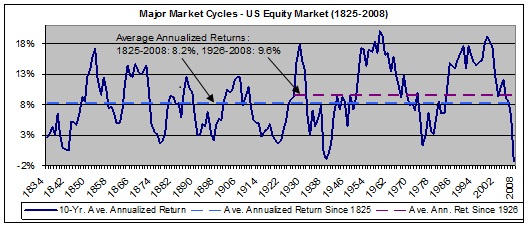
That’s one “mean reversion!” If historical 10-year average cycles are any predictor, now is not the time to abandon long-term strategies (see chart). The response to excess in the form of the dot-com-bomb and the credit-crunch-chaos caused the last 10 years to be one of the worst in U.S. history. However, notice that weak 10-year periods always overshoot the mean, and are often followed by strong recoveries (i.e. your friend,…
Quarterly Thoughts – Q4 2008
The Chinese character for “crisis” is actually a composite of two other characters: “danger” and “opportunity.” Current financial markets are volatile, but also provide opportunity. By rebalancing portfolios, investors “buy low” and “sell high” systematically. At a time when stocks are “on sale,” by not selling, we are in effect “buying” at possibly bargain prices. Discipline pays off over the long haul.
Year-end 2008
It has been said that pilots are paid for “takeoffs” and “landings.” The recent “Miracle on the Hudson” is a reminder of the value of proper process and guidance during freak-events. A flock of birds flew into a jetliner’s engines rendering the engines useless, but a pilot with a lifetime focus on risk management successfully landed the plane in the Hudson River. It was a frightening, and there were minor…
Quarterly Thoughts – Q3 2008
Markets continue to be difficult. However, panic can damage long-term profit. As Burton G. Malkiel, professor of economics at Princeton University wrote recently in The Wall Street Journal, “Just because stock markets have panicked, investors should not. A century of investing experience, as well as insights from the field of behavioral finance, suggests that investors who bailout of equities during times like these are almost always making the wrong decision.”…
Quarterly Thoughts – Q2 2008
The Bear market has officially arrived, as measured by S&P 500 dropping 20% from its peak. There have been 31 bear markets since 1900, averaging one every 3 or 4 years. According to Standard and Poor’s Equity Research, we have experienced nine bear markets since 1956. They have varied in magnitude from the decline of 20% in 1990 to the drop of 48% in 1973-1974 to the plunge of 49%…
Quarterly Thoughts – Q1 2008
The credit/liquidity crunch and housing market decline continues… daily volatility is higher than average. The Reality of Red Numbers is a helpful reminder of how negative markets are more common and frequent than many people tend or like to remember. During uncertain times like these, it is more important than ever to stick with your long term investment strategy rather than react emotionally to the day-to-day market fluctuations. Resorting to…
Quarterly Thoughts – Q4 2007
Market volatility is the norm, not the exception. Clear patterns seem to appear… and then disappear. The “Periodic Table of Investment Returns” illustrates this well, and a strategic approach to investing ensures that investors benefit from the best returning asset classes, while avoiding over-exposure to the worst performing asset classes. The key message is that a diversified portfolio approach will combine many or all of these and other asset classes (as…
Year-end 2007
This is the time of the year that we honor and express our gratitude for our clients and friends. We do so by making donations to worthwhile causes that have directly and indirectly touched our lives or those of our clients. This year we have contributed to: • American Cancer Society • American Heart Association • Kaiser Permanente Hospice Program • Michael J. Fox Foundation for Parkinson’s Research • National…
Quarterly Thoughts – Q3 2007
A process for best-thinking. WealthStep’s purpose is to positively impact lives and the goal achievement of our Clients, with a special focus on people who can’t access or don’t yet want a full-service advisor. To keep our clients’ lives simpler, we conduct a broad set of investment research and monitoring “under the hood” on your behalf. Just to name a few elements of our process, we oversee your accounts, monitor…
Quarterly Thoughts – Q2 2007
Unfortunately, the vast majority of investors around the world are “served” by firms that don’t put their clients’ interests first… and 74% of investors are not even aware of the conflicts affecting them, nor the negative impact on their goals. WealthStep is proud to always place our Clients’ interests first. In 1991, WealthStep’s parent company became one of the first firms in the US to be a fee-only advisor. A…
Quarterly Thoughts – Q1 2007
Recent volatility has made some investors nervous. However, the recent Dalbar study update is a reminder of the long-term opportunity cost of emotional investing: The S&P 500 Index’s average annualized return over the last 20 years was 11.9%, while the average equity mutual fund investor’s return was just 3.9%. This equates to a loss of 8% per year over 20 years, due to emotional investing, and illustrates the value of…









